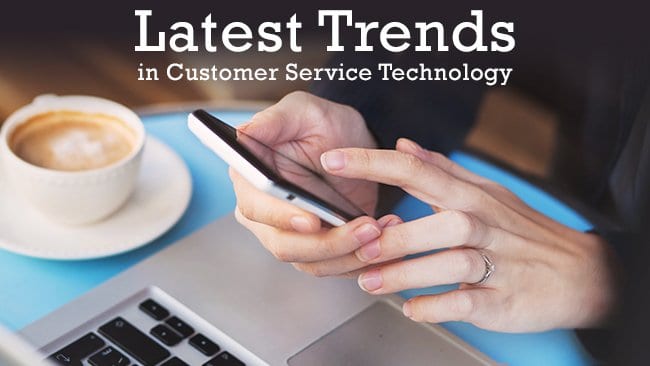
5 Technological Trends in the Call Center
What are the new technologies being deployed in the contact centers? Several key trends are currently dominating the landscape, and have already started to infiltrate the industry even well before this year.
Through advancements in technology, interactions have become easier, friendlier and more cost effective. To help you stay on target for 2017, we’ve identified 5 of the most influential trends affecting the future of call centers:
-
Cloud Contact Centers
Cloud contact centers offer huge boosts in call center efficiency, with 24/7 support, along with increased data security, flexibility, and adaptability, particularly any platform needs to be able to to be integrated cloud CRM platforms such as Salesforce, Zendesk, SAP, and even Facebook. Integrating with cloud CRM makes the cloud contact centers a real benefit for businesses who want to promote team communications and collaboration. It’s no surprise then that the cloud contact center industry is set to take a serious jump forward within the next five years. In fact, according to research just released from Markets and Markets, the cloud contact center industry is projected to increase nearly threefold – from $5.43B to $15.67B between now and 2021. Meanwhile, Gartner recently predicted that more than $1 trillion in IT spending would be directly or indirectly affected by the shift to cloud during the next five years.
2. Big Data Analytics
The trend toward big data analytics is changing how call centers communicate with customers. Even smaller businesses have massive amounts of data and are taking advantage of sophisticated analytics to turn data, such as chats, call and screen recordings, SMS messages and more, into valuable insights into customer behavior and preferences. The analysis of the Big Data provides feedback that is used to deliver a more personalized customer service. Clients who receive high-quality personalized call center service increase their purchases and prove their loyalty. Furthermore, by leveraging big data analytics, brands can identify customer pain and passion points more efficiently. Big Data analytics even help companies anticipate the client’s needs in advance and quickly resolve the customer interaction. In the coming year, as companies continue implementing more unified communications platforms and strategies, look for more advancements in analytics to leverage customer data from CRM to create more tailored experiences.
3. Chatbots
A trend that is growing fast today is the use of Artificial Intelligence that is based on using big data. Call center operations, as more and more businesses are using artificial intelligence applications to help harness big data and make call center experiences for customers and agents streamlined. First, companies collect a vast amount of customer data that AI systems translate into machine learning that becomes smarter and smarter about the clients and their issues. The process of collecting data analyzing it and adding more data and analyzing it again allows the machines to give the correct answers over time. As customers today expect to receive instant service across all channels at all times, intelligent virtual personal assistants can provide fast, cost-effective and human-like customer service for almost any interface, like voice response or mobile apps, SMS, the web, and instant messaging. Since there is a large growth of these channels, companies are adopting Chatbots that meet the rising volume of online support requests and even with quicker response times.
4. Omni-Channel Communications (in a Multi-Channel World)
As call centers expand their multichannel offerings, creating an “Omni-channel” experience is crucial. A good Omni-channel experience means that the company has to connect all the applications so they can to seamlessly work together. A customer that started purchasing and item on their smartphone needs to be able to continue the order on their desktop. When the customer has a question to ask about the order on the phone, the agent (either chatbot or human) needs to be able to see the shopping cart that was last updated, etc.. Otherwise, customers will drop off the order and forget about it all together. Customers expect the process to be unified., Surprisingly, though, only 36% of contact centers can track a customer journey that spans multiple channels, and only 17% can locate problem hotspots that impact the customer experience. This is a major issue for many contact centers, as customer expectations for Omni-channel support and execution are only increasing. One thing is for certain, the move towards Omni-channel is already happening, and its implementation is one every company needs to take very seriously.
5. Mobile Customer Support
According to a BI Intelligence report, mobile commerce will make up 45% of total e-commerce, equaling $284 billion in sales by 2020. Customers are purchasing more and more products and services from their Smartphone, so they also expect to be able to receive customer service on their Smartphone at the same time. In fact, a report on mobile CX found 63% of consumers use mobile devices a few times a month or more to search online for customer and product support.
We expect that more call centers will integrate mobile customer support into their customer service arsenal in the upcoming year.
Each of these innovations can create a positive, customer-centric experience that gives consumers more of what they want, while call centers will also benefit from getting a deeper understanding of their customers, along with new ways to deploy this knowledge and driving higher profits. Sounds like a win-win to us!
Learn more about Uniphore and how we are helping companies keep up with these trends through innovative solutions like Visual IVR.
[About the author]


